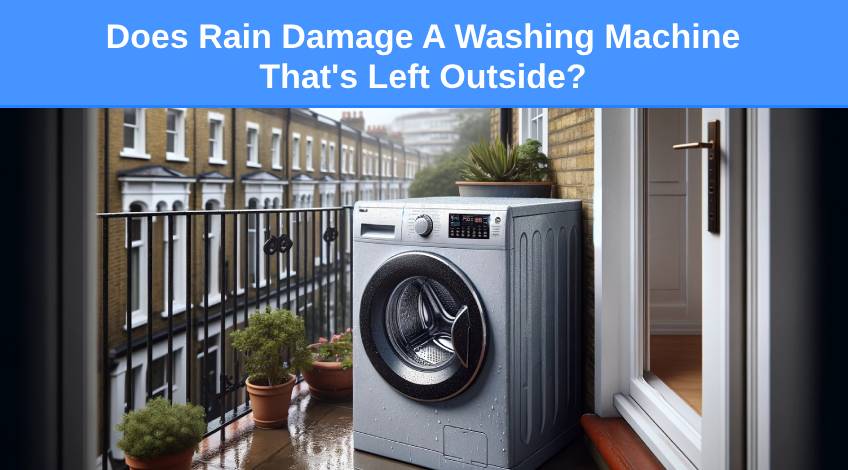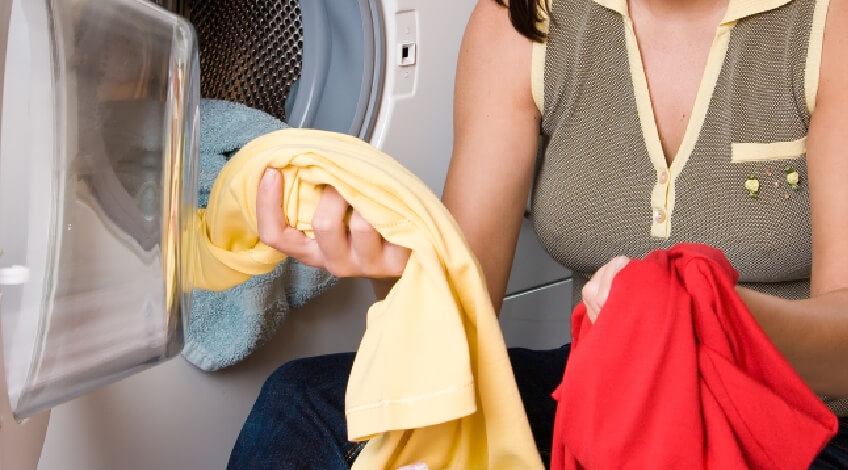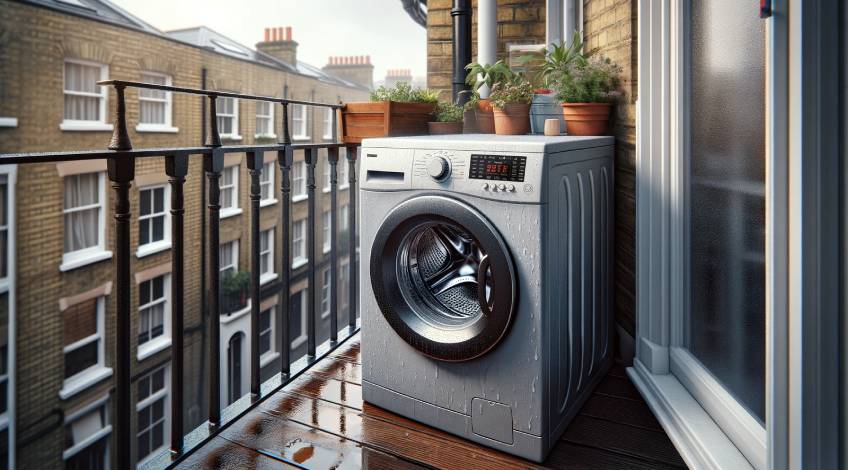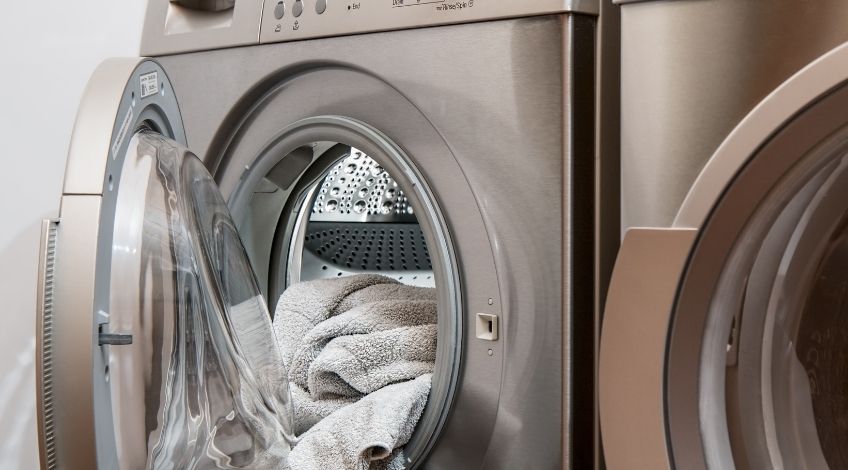
Does Rain Damage A Washing Machine That’s Left Outside?
Absolutely, it does. Rain can damage the machine’s electronics, which aren’t waterproof, and this can lead to a whole host of problems – from short circuits to permanently damaged parts.
Plus, rain exposure could void your warranty, cause mould growth, and lead to rust.
Curious to know more? Keep reading to find out why it’s a bad idea to leave your washing machine outside and what you can do to protect it.
You Shouldn’t Leave Your Washing Machine Outside (here’s why)
Washing machines, by design, are meant for indoor use. When you place them outdoors, you expose them to elements such as rain, snow, and sun which they simply aren’t built to handle.
Your Washing Machine Is Not Waterproof
While the inside drum is fine with water, the exterior and internal electronics aren’t waterproof.
Water ingress, or water reaching parts of the washing machine where it shouldn’t, can happen if you leave your machine exposed outside and it gets rained on.
Water can then seep through the gaps and cracks, potentially causing a short circuit or permanently damaging mechanical parts and the motor of the machine, affecting its performance and longevity.
You’re Exposing Yourself To The Risk Of Electric Shock
Getting an electric shock from your washing machine is no joke, and it’s a risk if it gets wet. This happens when its electrical components get wet and you touch it. To avoid this, make sure your machine is earthed properly.
In the UK, this is pretty straightforward. Washing machines come with a 3-pin plug that includes an earth pin. Just plug it into a properly installed and working outlet, and your machine is safely earthed.
But remember, using extension cords with your washing machine isn’t a great idea, especially in areas prone to wet conditions, unless they’re specifically designed for heavy-duty use and include an earth plug. The safest bet is to connect your washing machine directly to the main power and water supply. This way, you’re reducing the risk of electric shock and keeping yourself safe.
Your Washing Machine’s Warranty Could End Up Void
Be careful where you put your washing machine. If it’s left outside and gets damaged, you might wave goodbye to your warranty.
Most warranties clearly state where the washing machine should be installed and used – indoors. If your machine gets damaged from being outside in the rain, the manufacturer might refuse to cover the repairs or replacement.
To avoid this headache, it’s best to stick to the guidelines laid out in the washing machine’s manual. That way, you keep your warranty intact.
Your Washing Machine Is At Risk Of Mould

Rain on your washing machine can be a free ticket for mould and mildew to move in. If your washing machine is left outside in the rain, moisture can creep into parts where it’s not meant to be. This dampness is a breeding ground for mould and mildew.
This isn’t just about a bad smell – it can mess with how your washing machine works. Plus, there’s a health risk here too, as mould from your machine can get onto your clothes. No one wants to wear mouldy clothes! So, remember to keep your washer in a dry spot to avoid these mouldy problems.
Your Washing Machine Is More Vulnerable To Rust
The majority of your washing machine, including its exterior, is made from metal. Although these parts have some resistance to moisture, they’re not invincible against continuous rain.
Over time, rain exposure can cause the metal to rust and corrode. Rust not only weakens the metal but also affects the machine’s overall performance. In a nutshell, if your washing machine is always getting rained on, it’s going to rust, and that’s bad news for its lifespan.
Your Washing Machine Suffers From UV Ray Exposure
Don’t forget about the sun! Along with rain, your washing machine also faces harm from UV rays when left outside. Over time, these rays can make the outer shell of your washing machine fade or change colour. So, if your washer is out in the sun a lot, it might start looking old and worn quicker than it should. It’s another good reason to keep your washing machine under cover and away from direct sunlight.
What You Need To Do If Your Washing Machine Has Been Rained On

If your washing machine has had an unexpected shower, don’t rush to turn it on to check if it still works; that could make things worse.
Here’s what you should do instead: First, cut the power. Turn it off and unplug it from the socket. This step is crucial to prevent any further damage or electrical hazards.
Then, it’s time to dry it off. Grab a kitchen towel and get to work. Focus on removing as much water as possible, especially any that’s made its way into the crevices.
After you’ve done your best to dry it, call in a professional. They can give your machine a thorough check to make sure it’s safe to use again. Remember, it’s always better to be safe than sorry when it comes to electrical appliances and water!
Keep Your Washing Machine Safe From Rain Damage

Protecting your washing machine from rain and other weather elements is important, especially if outdoor storage is your only option. Here’s how you can do it:
Use A Washing Machine Cover
A washing machine cover is an excellent choice for protecting your appliance when it’s outside. These covers are specifically designed to shield your washer from the elements, such as rain and sun.
The key advantage of a washing machine cover is its breathability. This feature allows air to circulate around the machine, which helps to prevent the buildup of moisture and, subsequently, the growth of mould and mildew.
Although they might cost a bit more than other options, their quality and durability make them a worthwhile investment for long-term protection.
In contrast, if you’re in a pinch, particularly when moving your washing machine in rainy conditions, plastic covers or tarps can be used as a temporary solution. These materials are effective at waterproofing and will protect your washing machine from getting soaked during transport.
However, they’re not breathable like dedicated washing machine covers, meaning they can trap moisture underneath. This can potentially lead to issues like mould if used for extended periods. Therefore, they’re best used only for short-term protection, such as during transportation in wet conditions.
Add A Stand For Your Washing Machine
Putting your washing machine on a stand is a smart move, especially if you’re planning to place it outdoors. A stand keeps the machine raised above the ground, protecting it from water that might gather beneath it, particularly in rainy conditions and areas prone to flooding.
But here’s a tip: make sure the stand is sturdy enough to support the weight of the machine, especially when it’s running. And don’t forget, a stand made from materials that won’t easily rot is your best bet.
Put Your Washing Machine In A Shed

If you really have no choice but to keep your washing machine outside, consider putting it in a shed. However, it’s not just any shed that will do the trick. A brick or metal shed is your best bet because they handle moisture better than wooden ones.
Wooden sheds can develop mould and rot due to the moisture from the washing machine. Plus, the vibrations from the machine might be noisier in a wooden shed and could even damage the structure over time.
Remember, you’ll also need access to water and electricity in the shed for your washing machine to function properly.
SEE ALSO: Can You Put A Washing Machine In A Garage?
Frequently Asked Questions
No, it’s not OK to leave the washing machine outside. They’re not built to handle weather like rain or snow, and you risk damage from water, rust, and electrical issues.
If a washing machine gets rained on, water can sneak into parts where it shouldn’t be, leading to potential short circuits, rust, mould, and even a voided warranty. Plus, there’s a real risk of an electric shock if you touch it.
To protect your outdoor washing machine, consider using a cover, elevating it on a stand, or placing it in a suitable shed. These measures help shield the machine from rain and other weather-related damage, preserving its performance and longevity.
Yes, you do need to cover your washing machine if it’s outdoors. A good cover shields it from rain, sun, and other weather elements, helping to prevent rust, mould, and other weather-related damages.




